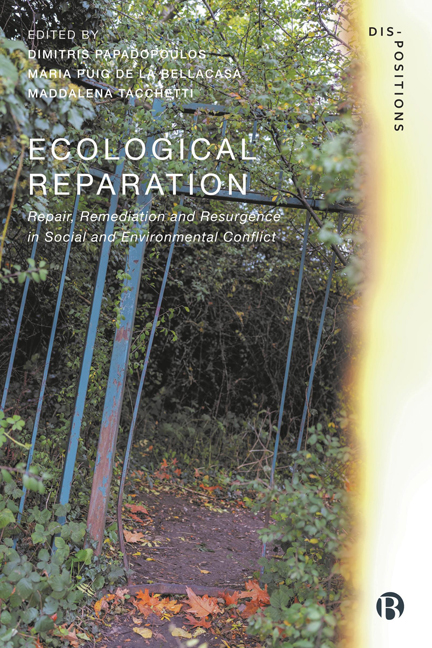Book contents
- Frontmatter
- Contents
- List of Figures
- Notes on Contributors
- Acknowledgements
- Note on the Figures
- Dis-Positions Series Preface
- Introduction: No Justice, No Ecological Peace: The Groundings of Ecological Reparation
- PART I Depletion<>Resurgence
- PART II Deskilling<>Experimenting
- PART III Contaminating<>Cohabiting
- PART IV Enclosing<>Reclaiming Land
- PART V Loss<>Recollecting
- PART VI Representing<>Self-governing
- PART VII Isolating<>Embodying
- PART VIII Growth<>Flourishing
- Index
16 - Conversations on Benches
Published online by Cambridge University Press: 28 March 2024
- Frontmatter
- Contents
- List of Figures
- Notes on Contributors
- Acknowledgements
- Note on the Figures
- Dis-Positions Series Preface
- Introduction: No Justice, No Ecological Peace: The Groundings of Ecological Reparation
- PART I Depletion<>Resurgence
- PART II Deskilling<>Experimenting
- PART III Contaminating<>Cohabiting
- PART IV Enclosing<>Reclaiming Land
- PART V Loss<>Recollecting
- PART VI Representing<>Self-governing
- PART VII Isolating<>Embodying
- PART VIII Growth<>Flourishing
- Index
Summary
Introduction
The conversations that follow took place while walking through the green spaces of Bristol, in South-West England, in preparation for Linda’s latest ‘act of care’: a commissioned artwork that performs a detailed, delicate repair on an object in public space. The act of care will take as its object a park bench, and on this occasion we’re on a tour of benches in Bristol’s urban parks, looking at their designs and materials, at how, when and where they were made, and where they have been adorned, damaged and repaired.
Public benches hold us; they support us when we need to rest, or talk, or perhaps sleep. They are sites of breakups, of impromptu get-togethers, of wistful daydreams and of drinking and drug taking. They are truly public amenities: an often-overlooked aspect of everyday infrastructure that tends to our bodily comfort, and our need to pause. Our focus on benches helps us to think about how we care for and relate to public objects, and how they in turn care for us. Here, we consider benches as sites for reparation, both against the neglect of public objects and spaces that has been an ongoing feature of the UK under neoliberalism, and against our alienation and separation from each other and from our worlds.
This chapter discusses our relationship to these everyday material infrastructures in the context of neoliberalizing forces that erode the idea of the ‘public’. Drawing on the work of political theorist Bonnie Honig and psychologist Donald Winnicott, it argues for the importance of public objects: shared material forms that physically hold us, and provide material resources for the production of public life. Through a series of conversations, we explore what it means when these objects are invested in, valued and cared for, and what we can do when it is unlikely that this will happen. Linda’s work has, for many years, involved care and repair of public objects. Her acts of care – towards public toilets, streets and benches – are a provocation to rethink how we might care for objects and things. They model an ethos of care towards the world which is not reciprocal yet embeds ways of relating to objects into wider networks of support and worlding.
- Type
- Chapter
- Information
- Ecological ReparationRepair, Remediation and Resurgence in Social and Environmental Conflict, pp. 242 - 257Publisher: Bristol University PressPrint publication year: 2023

